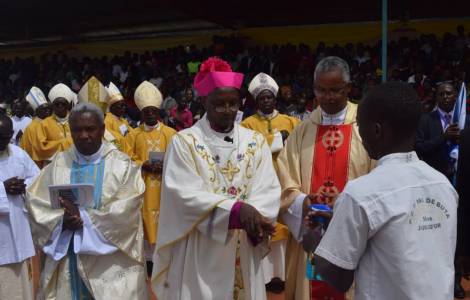
Rome (Agenzia Fides) - "The diocese of Bururi is the largest territorially but it is the last in terms of percentage of Catholics", says to Agenzia Fides Msgr. Salvator Niciteretse, bishop of Bururi who is in Rome for the bishops' seminar newly appointed.
How can this situation be explained?
"This is because, before the formation of the diocese, there were already other Christian denominations, such as Anglicans and Pentecostals, present since the 1930s, while the Catholic diocese was established in 1961. Catholics currently represent 45 % of the population of the area where the diocese of Bururi is located, while in other Burundian dioceses this percentage is 80%. This situation can be exemplified by the fact that there are up to three Anglican bishops in Bururi, while I am the only Catholic bishop. The population is one million seven hundred thousand souls spread over three provinces: Bururi, Makamba and Rumonge. Therefore, I have to deal at the level of civil authorities with three governors with whom we have good relations. We have 30 parishes. Since I became a bishop, I have founded four and another 12 are in the process of being founded in small steps.
What are the challenges to evangelization?
In this multi-faith context (there are also some Muslims) the biggest challenge is the proliferation of new religious movements, the so-called sects. But this does not prevent the Catholic Church from seeing its ranks of believers increase. Many people from sects or other Christian churches end up joining the Catholic Church. Some 3,000 people join us each year.
In any case, collaboration with other religions is good. Whether Muslim, Pentecostal or otherwise, collaboration works especially well in times of crisis or special circumstances. When the bishop emeritus died, Protestants and Muslims attended the funeral.
Poverty is another challenge for evangelization. Burundi is a poor country. The construction of parishes, schools and health centers becomes a great challenge, despite the generous efforts of the local faithful who support the Church's initiatives to the best of their ability.
Another challenge is the spread of a sometimes superficial faith. There is not always a conscious or committed faith in the transformation of society. That is why there is a faith that does not have a reflection in society. This, in my opinion, is quite a serious challenge.
Burundi has a past of civil wars. How does this past affect the life of the population and of the Church?
Reconciliation is another challenge. The Truth and Reconciliation Commission is not always viewed favorably by everyone. Some claim that “reconciliation does not apply to everyone” or that “only partial truths have emerged”. But despite everything, the efforts for peace continue. The Church itself works for peace and reconciliation in homilies, in messages. We have had synods on justice and peace.
It seems to me that at the level of the people there are no major problems for reconciliation: the biggest problems are at the level of politicians who have ideologies and interests to defend.
Social discrimination is at the root of violence. But our President is fighting against social injustice and discrimination, against corruption.
His diocese and the Church in Burundi are about to celebrate important anniversaries…
An important event for the diocese of Bururi is the memory of the murder of 40 seminarians in 1997, who refused to be divided into Huti and Tutsi ethnic groups. I am about to close the diocesan investigation for his beatification, along with that of two Xaverian priests and a layman who were also murdered (see Fides, 24/7/2019). The whole process is entitled "Father Michel Kayoya and his 43 companions". On August 2 of this year we presented the conclusions of the diocesan process.
At the national level, we are preparing to celebrate the 125th anniversary of the Evangelization of Burundi. The celebrations will begin on October 1 and will end on August 15, 2023. We have put the family at the center of the Jubilee because there is no true evangelization without the evangelization of families. (L.M.) (Agenzia Fides, 27/9/2022)